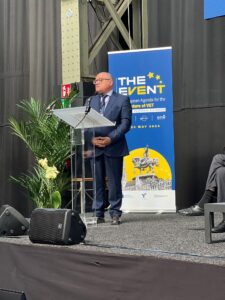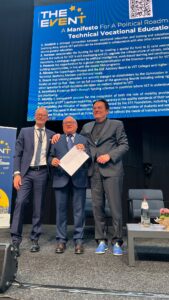EfVET (the European Forum for Vocational Education and Training), EVBB (the European Association of Vocational Training), and EVTA (the European Vocational Training Association) joined forces for the first time in their long history and organized an international conference on A European Agenda for the Future of VET at the AutoWorld in Brussels on 23-24 May.
Over 260 delegates from 45 countries participated, including VET practitioners from China, Morocco, Algeria, the United States, Canada, Palestine, Egypt and Malaysia. MCAST’s principal and CEO was one of the three conference chairpersons. The others were the presidents of the two other organisations, Giorgio Sbrissa (EVTA) and Thiemo Fojkar (EVBB). The meeting focused on three overarching themes: VET eco-system, Excellence and Empowerment and leadership. Experts led the panel discussions from the EC, the OECD, WorldSkills, SMEUnited, Business Europe, Tknika and other non-governmental organisations and training practitioners.

The scope of the conference was to initiate a European and Global VET reform process that would establish the levels of excellence, quality and relevance of VET provision to learners and employers. The target is to enable VET practitioners to take ownership of the VET reform processes that determine the quality standards and the esteem of VET among employers and other stakeholders. In his opening speech MCAST Principal said, “The Copenhagen Process in 2002 gave high hopes to a European VET system at par with other sectors of education. This process has achieved remarkable targets in bringing players together to discuss the reform structures VET needs but has failed to impact the heart of VET and training practitioners. Research in VET has been sterile and taken over by organisations outside the EU system. From a golden age of VET, we now risk moving to a bronze age in which training providers will continue to act as stakeholders in EU fora when their real role is that of shareholders of important landmarks in VET provision in excellence, quality and esteem”.

Participants had the time to discuss challenges facing VET at European and global levels, including the impact of AI, quality assurance, excellence, the role of employers and, in particular, SMEs, micro-credentials, teacher training, support services in VET and governance and financing. At the end of the conference, the Presidents of EfVET, EVBB and EVTA (the most significant European association of VET practitioners) signed a Manifesto pledging their collaboration to establish more vital collaboration, increase funding for VET, promote global internationalisation of VET, advocate for statutory representation of VET practitioners in EU agencies and decision-making processes, create an EU Quality Label and initiate a reform process that will put VET at par with other sectors of education.







 MCAST Main Campus
MCAST Main Campus  +356 2398 7100
+356 2398 7100
 information@mcast.edu.mt
information@mcast.edu.mt